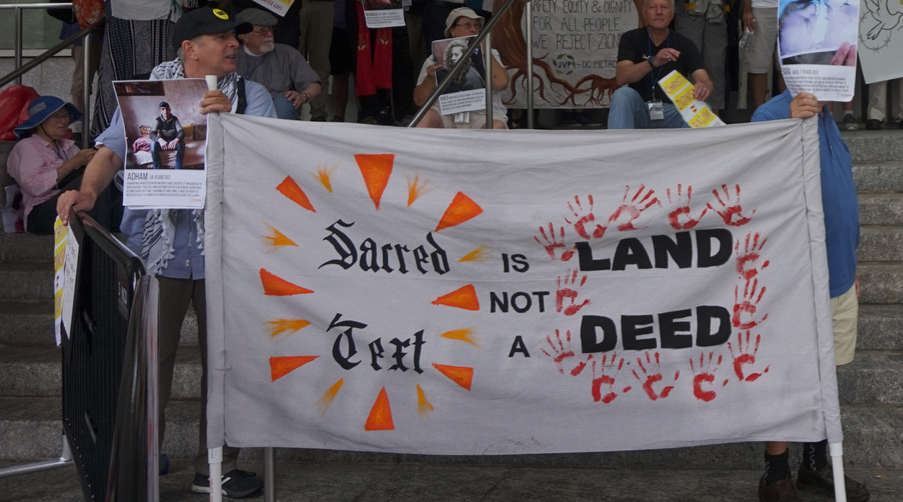The Doctrine of Discovery and Christian Zionism
Abstract
The Doctrine of Discovery (DoD) has a well-documented and researched connection to the colonization of Turtle Island. Its ideology, however, reaches far beyond the continent’s bounds. What is less researched is the DoD’s connection to European colonialism in the rest of the world. In this paper, I will explore how the settler logic, clearly articulated in the DoD, was and continues to be an animating factor of the colonization of Palestine through Christian Zionist political thought and action. Dating before the political Jewish Zionist movement, British Christian theologians imagined a Jewish “return” to Palestine as a dispensational necessity. Devout Christian British leaders like Prime Minister David Lloyd George and Lord Arthur Balfour made this a political reality in the early 20th century. Formerly under British mandate, the newly created state of Israel in 1948 has been viewed as a European colonial outpost by critics and supporters. This is rightly understood as more closely connected to the religious aspects of colonialism than economic or political. After Israeli military forces occupied Jerusalem in 1967 a new wave of far-right Christian Fundamentalists (mostly in the United States) became supporters of Israel’s most expansionist colonial policies. Today Israeli leaders openly admit that the backbone of support for Israel is Evangelical Christians. Understanding Christian colonialism as a key aspect of what is often misnamed as “The Israeli-Palestinian Conflict,” we can see the key concepts of the Doctrine of Discovery being used, specifically Christian domination, terra nullius, and divine right to subjugate.
The Doctrine of Discovery and Christian Zionism
Introduction
The Doctrine of Discovery (DoD) has a well-documented and researched connection to the colonization of Turtle Island. Its ideology, however, reaches far beyond the continent’s bounds. What is less researched is the DoD’s connection to European colonialism in the rest of the world. In this paper, I will explore how the settler logic, clearly articulated in the Doctrine of Discovery, was and continues to be an animating factor of the colonization of Palestine through Christian Zionist political thought and action.
The quintessential quote to understand the ideology of the Doctrine of Discovery can be found in Dum Diversas by Nicolas V to Alfonso V, “We grant you by these present documents, with our Apostolic Authority, full and free permission to invade, search out, capture, and subjugate the Saracens and pagans and any other unbelievers and enemies of Christ wherever they may be, as well as their kingdoms, duchies, counties, principalities, and other property […] and to reduce their persons into perpetual slavery.”
The horrendous legacy of this doctrine upon indigenous peoples of North America has been well documented. The colonial concepts of the DoD made their way clearly into U.S. land law and have been used as recently as 2005 to deny Native Americans land rights. Less studied are the various areas of Christian political thought and diplomacy which are born from the ideology of Discovery.
One often overlooked example is how the trans-Atlantic trafficking of African peoples leaned heavily on the concept of “perpetual slavery” of “pagans” to create the legal mechanisms of enslaving African people. I contend that Western interference in Palestine, led by the British (and later American) Empire is another overlooked offshoot of the Doctrine of Discovery.
The colonization of Palestine has been backed heavily by the theology of Christian Zionism, an ideology that draws heavily on the Doctrine of Discovery to justify colonization, particularly the concept of terra nullius and white Christian dominance. Understanding these connections helps situation the Palestinian struggle for self-determination as part of the global decolonization movement.
Christian Zionism’s rise to political power
Britain came to political power in Palestine after World War One, but its influence on the region goes back much further. As transportation technology allowed Brits to travel more in the early 1800s, Palestine became a major destination, and British theological theories about the “Holy Land” began to boom. This is also at a time when Britain was at the height of its colonial expansion. The theology mimicked the imperial mindset. British Christians thought of themselves as “Christian Soldiers” enacting God’s battle plans from the Bible into the modern era, or “dispensation,” to use the term that would define this form of theology. With an eye on Palestine, they believed that Jewish rule in Palestine was part of God’s strategy for winning the universal battle of good vs evil. God’s strategy also included converting Jews to Christianity, sending everyone who wasn’t a Protestant to hell, and bringing on the apocalypse. It was a Christian Zionist, Rev. Alexander Keith, who, in the 1850s is credited with coining the term, “A land without a people for a people without a land” to describe the political and theological underpinnings of his desire to send Britain’s Jewish population to Palestine.
By the late 20th century, leading theological, cultural, and political figures in Britain were deeply influenced by this idea of sending Jews to Palestine. Proponents of “Restorationism” as Christian Zionism was known then included John Locke, Sir Isaac Newton, George Elliot, Prime Minister David Lloyd George, and Lord Arthur Balfour to name a few. These political leaders supported the fledgling Jewish Zionist movement, helping it grow power and influence in Britain. Jewish Zionists didn’t have the power to see their settler colonial project succeed in Palestine, but by aligning with antisemitic Christian Zionists who wanted them out of Europe they were able to achieve their goals.
This alliance culminated in the Balfour Declaration, in which British Foreign Secretary Arthur Balfour, himself an antisemite, gave British backing to a “Jewish state in Palestine.” This gave Jewish political Zionism international recognition. The Balfour Declaration is still celebrated as justification for the Zionist colonization of Palestine. This British, and broader Western support for Israel continues to this day. Despite a consensus amongst international human rights organizations that Israel is an apartheid state, Israel receives special treatment from the “Western world,” especially the United States.
The United States is considered Israel’s most stalwart ally. It is no coincidence that this support comes from a country whose public discourse has been more deeply shaped by Christian Zionism than any other. The US became the center of Christian Zionist thought in the early twentieth century when leading American evangelists saw how popular the ideas were with their audiences. Christian Zionism became a key pillar of the Christian Fundamentalist movement of the early 1900s. That movement – and the Evangelical “Religious Right” movement it has spawned – has mobilized millions of followers to oppose racial integration, women’s rights, LGBTQ rights, and indigenous rights. Throughout the century, as their political aspirations – and political enemies – shifted, support for Israel remains a major tenet of Christian Fundamentalism. It took on a new level of importance after the Israeli colonization of Jerusalem in 1967, which Fundamentalist pastors claimed was a fulfillment of the prophecy they had predicted. Therefore, using the colonization of Palestine as proof that their bigoted ideology is the true.
Today it is estimated that 20% of the US population believes that the State of Israel is a fulfillment of biblical prophecy, a key tenet of Christian Zionist thought. This constitutes a huge, organized voting bloc. The largest lobby supporting Israel’s attempts to displace Palestinians is Christians United for Israel. The largest groups giving money directly to Israeli settlements are Christian Zionist. Christian Zionists support Israel’s most repressive, colonial, and potentially genocidal policies. Christian Zionists are a major force behind the United States’ continued financial, military, and ideological support for the apartheid Israeli regime. As a former Israeli ambassador put it the “Backbone of Israeli support in the US is Evangelical Christians.”
Connecting Christian Zionism and the Doctrine of Discovery
The colonial theology of Christian Zionism is deeply tied to the ideology of the Doctrine of Discovery. Take for instance the rallying cry of the Christian Zionist – and later Jewish Zionist – movement “A Land without a People for a people without a Land.” Anyone who went to Palestine in the mid-1800s would have seen a thriving Palestinian community made up of indigenous Muslims, Christians, and Jews. It wasn’t that there weren’t people there. The phrase came from the idea that the people were “no people” because they weren’t European and didn’t practice European Christianity. This is a redeployment of the concept of Terra Nullius, created by the Doctrine of Discovery.
Terra Nullius, or “Empty Land” is the idea that the lands that European Christians set foot on should be considered “empty,” as indigenous people not ruled by Christian kings did not count as people. In other words, “a land without people.” The denial of personhood set out by the Doctrine of Discovery not only led to land theft but also to the attempted genocide of indigenous peoples.
Similarly, this denial of Palestinian peoplehood allowed the Nakbah, or catastrophe. Nakbah refers to the ethnic cleansing of Palestinians, which the Zionist military started in 1948, and the Israeli state continues to this day. Over 750,000 Palestinians were removed from their homes in 1948 alone. Over 500 cities were literally wiped off the face of the map. Many were replaced with Hebrew-named cities. The displacement and colonization of Palestine continues today. Over the past year, Israel has drawn international scorn with its plans to displace more Palestinian families from the Sheikh Jarrah and Silwan neighborhoods of Jerusalem. It is also in the process of depopulating a dozen Palestinian towns in the Masafer Yatta region through the displacement of over 1000 Palestinian families.
Israeli officials openly advocate for Jewish supremacist laws. All of this is done with the help of the United States in the form of $4 billion a year in military aid (receiving more than any other country) and in political cover in the UN (The US has used its veto power to protect Israel from accountability more than any other country has used that power for any reason).
These actions by Israel, supported by the US, are still underpinned by the ideology of Terra Nullius. It is not uncommon to hear religious and political leaders in the US and Israel claim that Palestinians do not exist or are not a people. John Hagee, the head of Christians United for Israel, the largest “pro-Israel” lobby in the US has said, “There is no such thing as an autonomous Palestinian society. There is no Palestinian language. There is no Palestinian currency. There is no Palestinian pottery. It is all Arab. And before 1967 these people saying this land is our land lived in Syria, they lived in other Arab countries.” This idea was parroted by former Speaker of the House Newt Gingrich, who claimed Palestinians were an “invented” people. This idea of Terra Nullius connects Right-wing Christians with Right-Wing Israelis. Israeli Knesset member Anat Berko, claimed, in a session of parliament, that Palestinians couldn’t possibly exist, since they are Arabic speakers and Arabic doesn’t have the letter “P.” The denial of Palestinian peoplehood is important for Zionists, both Christian and Jewish, because it is a first step in denying sovereignty. Palestinians, like indigenous peoples in North America, have to fight these racist arguments that are based on the Doctrine of Discovery.
Seeing these connections provides an often-missing aspect of the discourse in the US about the situation in Palestine. While Christian Zionists portray it as a cosmic conflict of good vs evil, the mainstream narrative does not differ much, viewing it as an ancient religious conflict spurred on mostly by Muslim Palestinian’s hatred for Jewish people. This narrative is simplistic and is very similar to the racist “Cowboys and Indians” motifs amongst European settlers on Turtle Island. Understanding how colonial Christianity is an instrumental part of perpetuating the violence in the region helps debunk two false assumptions in the above narrative. First, it breaks down the “Jews vs Muslims” dichotomy by recognizing the role Western Christians have had historically and continue to play. Secondly, and more importantly, it reframes the situation from an equal conflict based on prejudice, to a struggle of an indigenous people against Western Colonialism.
The ideology of domination, of white/European supremacy, of divine right to indigenous land, and of empty land are not remnants of past theology. They are widely held amongst US Christians. Christian Zionism is but one colonial aspect of American Christianity. Christian Zionists tend to also be Christian Nationalists. In other words, those who hold a dehumanizing view of Palestinians also hold a dehumanizing view of Indigenous Peoples in the US. The fight against them connects the Palestinian and Turtle Island struggles for sovereignty.
SUGGESTED CITATION
Jonathan Brenneman, "The Doctrine of Discovery and Christian Zionism," Doctrine of Discovery Project (13 March 2023), https://doctrineofdiscovery.org/blog/christian-zionism/.
Download citation formats:
Share on
X Facebook LinkedIn BlueskyDonate today!
Open Access educational resources cost money to produce. Please join the growing number of people supporting The Doctrine of Discovery so we can sustain this work. Please give today.



